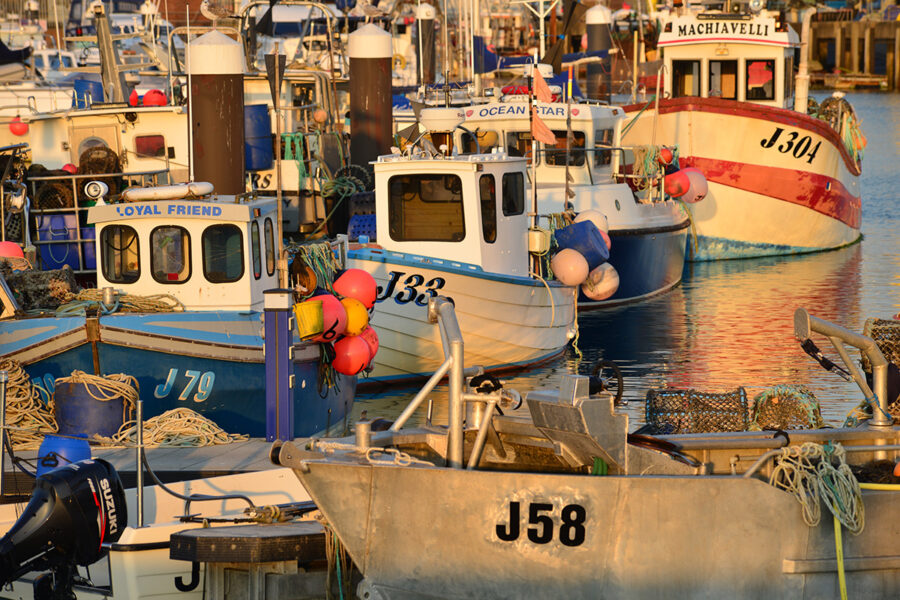The first face to face meeting between Jersey and French fishermen since the tensions over Brexit and restrictions on the number of French boats fishing in Jersey waters revealed significant areas of common interest between the two sides, report Tim Oliver.
A range of issues were addressed in what Don Thompson, president of the Jersey Fishermen’s Association, described as ‘frank and forthright discussions’.
“The fact is that 18 fishermen in a room can get more done than the politicians,” he told Fishing News.
“What’s really interesting is that our politicians attend what’s called the Normandy Summit. They sit together with heads of state from the Normandy region, etc, they exchange niceties, have a glass of wine and a meal, and spend a day together – and they actually solve nothing over the course of the year.
“Yet we can have 18 fishermen and their representatives together and come out with some strong proposals from a single day’s meeting. That says something, I think.”
He said ‘the boys didn’t hold back’, but that important areas of consensus emerged on big issues such as gear conflict, problems arising from the declassification of Jersey waters from Class A to Class B after Brexit, and pressure on space to fish from wind farms and protected areas.
On gear conflict, it was agreed that fishermen would exchange information directly with one another when static gear is being moved, and when trawlers and scallopers move into an area.
“We had an information chart showing what gear is normally in an area and what direction it runs in,” said Don Thompson.
“That’s quite a big issue here, because Jersey fishermen still use the old Decca lanes, because the grounds, the big offshore reefs, kind of run parallel to the Decca lanes.
“Everything runs that way, but the French tend to work in the opposite direction, so when you get Jersey and French fishermen working on the same piece of ground, the easiest way to avoid gear conflict is to make sure all the gear is going in the same direction.
“We’ve come up with a chart that all fishermen have access to that clarifies how the gear is running and what gear is in the area.”
There was also progress in addressing problems arising from the EU decision to declassify Jersey waters from Grade A to Grade B following Brexit, which particularly affects exports of Jersey scallops to France.
Brittany and Normandy test their waters almost weekly to prove their scallops are from Grade A waters, but some Jersey scallopers are still being prevented from landing in France because Jersey waters are officially Class B – even though they are as clean as they were before Brexit.
“The fact that our waters are Grade B is a risk to French fishermen, because their product caught in our waters is deemed to be coming from Class B waters,” said Don Thompson.
“They don’t test Jersey waters where they fish, and we’re saying to them they should. If the product requires that you have to test the water wherever it comes from, then it should be all waters, whether French or Jersey waters, and they agreed to that.
“That’s part of the reason they do the testing, to prove that the waters are really Grade A and that the product is from clean waters. That will add to making the case for reclassification back to Grade A, or the product coming from it to be classified as such.”
The meeting also discussed the need for French and Jersey fishermen to stand together to face the threat to their grounds from a range of interests, including a plan to close 30% of Jersey waters to mobile towed gear (see below).
“We told them there’s never been so much pressure on grounds for both French and Jersey fishermen,” said Don Thompson.
“There’s a massive wind farm being built to the south of us, plus there’s Blue Marine here in the island pushing very hard to create a marine park in our waters and to have all our waters up to three miles closed to mobile gear, which will also affect the French.”
Jersey fishermen also gave their French counterparts some details of the plans the Jersey government has to restrict fishing effort in Jersey waters.
“We put it on the table very clearly that management of our waters is not going to be about free access, but very much going down the route of effort control and technical measures, as opposed to quotas, etc.
“We made it very clear that they had to accept that some of what they’re doing now might not be possible, and there will be constraints across both fleets. We left it at that, because it’s something that’s being thrashed out between Jersey, the UK and Brussels.
“What was really good was that everyone in the room agreed we should continue to have regular meetings, and that as fishermen we stand much stronger together. We have got to think about how we maintain access to fishing grounds in the face of interest from so many other sectors.
“Fishermen need to stand together – I think that’s the message that came out of the meeting.”
This story was taken from the latest issue of Fishing News. For more up-to-date and in-depth reports on the UK and Irish commercial fishing sector, subscribe to Fishing News here or buy the latest single issue for just £3.30 here.








